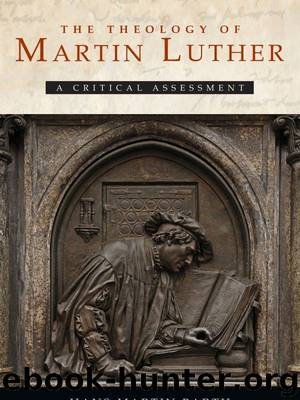The Theology of Martin Luther by Barth Hans-Martin

Author:Barth, Hans-Martin [Barth, Hans-Martin]
Language: eng
Format: epub
ISBN: 9781451424355
Publisher: Fortress Press
Published: 2012-11-01T00:00:00+00:00
Sacramental positivism?
The accusation that Luther’s idea of sacraments could represent an inappropriate materializing of the spiritual was expressed during the Reformation itself, both by the Reformed group and by the enthusiasts. The Enlightenment suspected magic and superstition here. Does Luther’s sacramental theology not contain a massive and insupportable amount of medievalism? The idea that a sacrament, while it does not work ex opere operato (by its very celebration), does have its effect simply through the speaking of a word that is received in faith was hard to distinguish from the traditional Roman Catholic idea of sacraments. Is it not true that this medieval overburden is evident in Luther’s reasons for infant baptism, in which tradition represented an important part of the argument? Did Luther “pursue a wrong path to its end”?[253]
Obviously we must admit that Luther was in fact a child of his time and could not simply divest himself of inherited ideas. But his sacramental theology is clearly anchored in the whole of his theological thought; it corresponds precisely to his theology of the word of God. The word transcends itself and so requires the sacrament. A human being does not live only from word to word; people are not appealed to only through words and they also react to the things that appeal to them by other means than words. A wholistic self-perception on the part of the human being in awareness of both hemispheres of the brain corresponds altogether to the mutuality of word and sacrament as Luther describes it. But more important for him was the theological argument, namely that it is God’s intention to grasp the human being as a whole and thus make Godself present to and communicate with each person totally—which includes the bodily dimension, to the depths of the material, psychosomatic self.
Nevertheless, the question remains whether the Reformer did not accept or propose inconsistencies that detract from rather than adding to his thought. We may refer to his notion of “childish faith,” his talk of the manducatio oralis of the unworthy and of the “ubiquity” of Christ, exalted in his human nature as well. The strong equation of the interpretation of the water of baptism as “Godly water” with the presence of Christ in the eucharistic elements is not persuasive either exegetically or in terms of systematic theology. Certainly, if we look more closely we can see that the points I have listed are by no means intended to ground theological statements; rather, they represent conclusions, consequences that no longer fit well within the picture and have no sustaining function in the architectonics of Luther’s theology. The Reformer may himself have regarded them as indispensable, but as derived notions they are not dogmas; they are only possibilities he thought of, suggested, and tested. Today, however, no one is obligated to accept them. Certainly he saw more clearly than some later theologians that theology cannot exist only as a sum of intellectually satisfying “consistencies”!
A third objection arises, certainly, from current exegesis: what is
Download
This site does not store any files on its server. We only index and link to content provided by other sites. Please contact the content providers to delete copyright contents if any and email us, we'll remove relevant links or contents immediately.
The Gnostic Gospels by Pagels Elaine(2527)
Jesus by Paul Johnson(2352)
Devil, The by Almond Philip C(2324)
The Nativity by Geza Vermes(2226)
The Psychedelic Gospels: The Secret History of Hallucinogens in Christianity by Jerry B. Brown(2149)
Forensics by Val McDermid(2088)
Going Clear: Scientology, Hollywood, and the Prison of Belief by Lawrence Wright(1978)
Going Clear by Lawrence Wright(1962)
Barking to the Choir by Gregory Boyle(1819)
Old Testament History by John H. Sailhamer(1809)
Augustine: Conversions to Confessions by Robin Lane Fox(1769)
The Early Centuries - Byzantium 01 by John Julius Norwich(1738)
A History of the Franks by Gregory of Tours(1720)
A Prophet with Honor by William C. Martin(1717)
Dark Mysteries of the Vatican by H. Paul Jeffers(1707)
The Bible Doesn't Say That by Dr. Joel M. Hoffman(1676)
by Christianity & Islam(1627)
The First Crusade by Thomas Asbridge(1601)
The Amish by Steven M. Nolt(1563)
